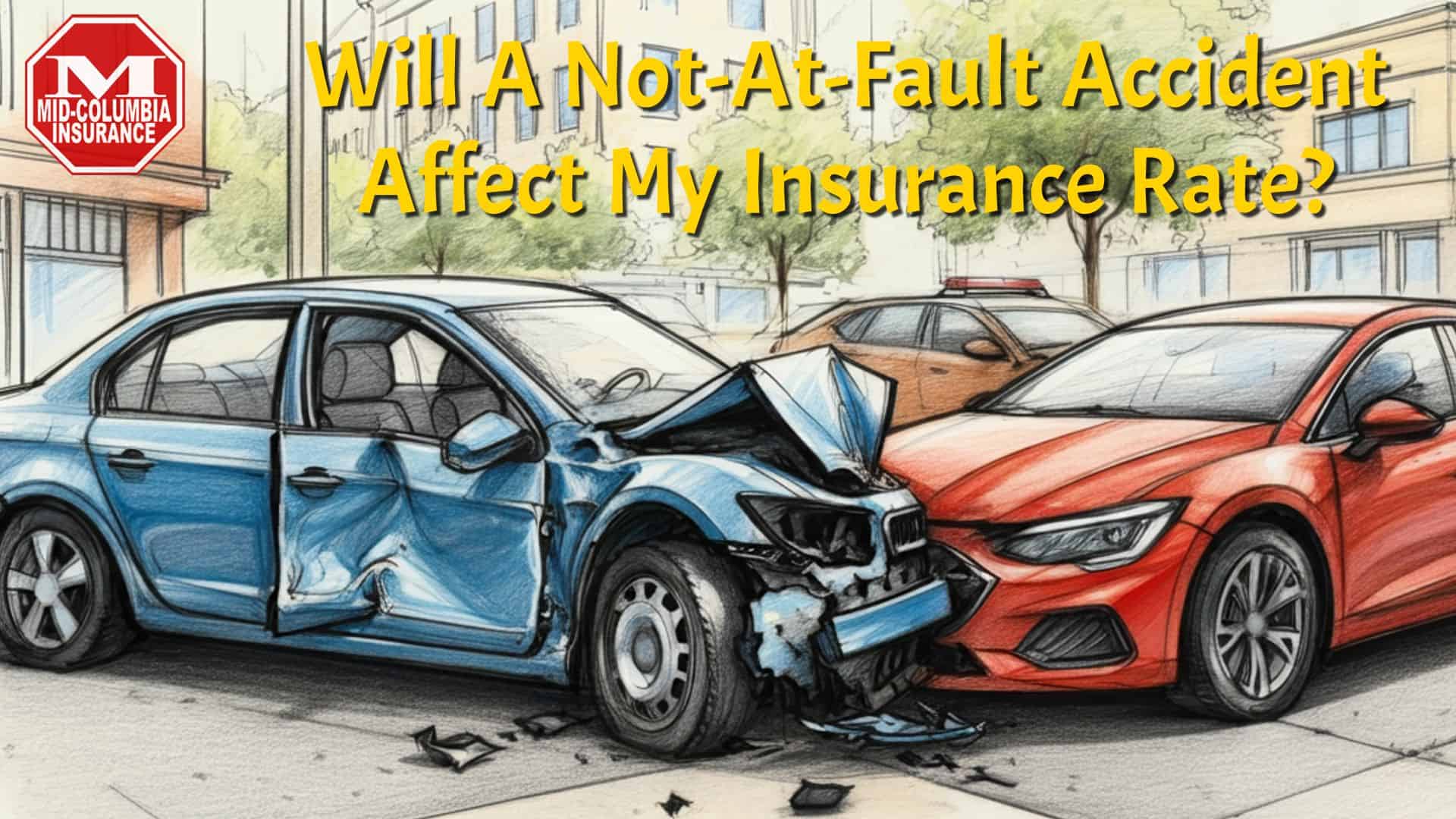
Understanding Not-At-Fault Accidents in Washington
Not-at-fault accidents in Washington state affect your car insurance rates through a complex interplay of insurance carrier policies, state regulations, and risk assessment factors. “Not being at fault doesn’t automatically protect your rates – but having the right documentation and agent support often does,” explains Gary Paulson, owner of Mid-Columbia Insurance.
Working with an independent agency like Mid-Columbia Insurance gives you access to multiple top-rated insurers including Progressive, The General, Safeco, National General, Bristol West, Dairyland, and Foremost, each with their own policies regarding not-at-fault accidents.
How Insurance Rates Change After a Not-At-Fault Accident
Your insurance rates after a not-at-fault accident depend on several key factors that insurance providers consider when calculating premiums. While Washington state offers certain protections for drivers, each insurance carrier handles not-at-fault accidents differently.
The following table shows typical rate impacts across different scenarios:
| Scenario | Typical Rate Impact | Duration |
|---|---|---|
| Clear not-at-fault with police report | 2-5% increase | 3 years |
| Partial not-at-fault | 5-10% increase | 3 years |
| Multiple not-at-fault claims | 10-20% increase | 3-5 years |
| Not-at-fault with accident forgiveness | No increase | N/A |
Protecting Your Rights After an Accident
Washington state law provides specific protections for drivers involved in not-at-fault accidents through established legal frameworks and consumer rights. The first step after any accident is documenting everything thoroughly while ensuring your rights are protected.
Essential steps to protect yourself:
- Gather witness statements
- Take extensive photos
- Contact your insurance agent
- Obtain detailed police documentation
- Keep all medical records
- Track all related expenses
- Document all communication

Filing a Not-At-Fault Claim Successfully
The not-at-fault claims process begins with proper documentation and ends with fair compensation through your claims adjuster working diligently on your behalf. Mid-Columbia Insurance partners with leading providers like Progressive and Safeco to ensure smooth claims processing.
Critical claim filing steps include:
- Report the incident to your insurance provider
- Submit all documentation promptly
- Work with assigned claims adjuster
- Review coverage details with your agent
- Track claim progress
- Maintain communication records
Financial Impact and Recovery Options
Not-at-fault accidents impact your finances through various cost factors beyond just potential premium changes. Understanding these impacts helps you make informed decisions about your insurance coverage and financial planning.
Consider these financial aspects:
- Deductible responsibilities
- Out-of-pocket expenses
- Lost time from work
- Vehicle repair costs
- Medical expenses
- Long-term premium effects
Choosing the Right Coverage Protection
Selecting appropriate coverage levels provides essential protection against not-at-fault accident impacts through careful evaluation of your insurance needs. Mid-Columbia Insurance offers policies from National General, Bristol West, and other top carriers to ensure you have outstanding protection.
Key coverage considerations include:
- Uninsured/Underinsured Motorist protection
- Collision coverage options
- Medical/Personal Injury Protection
- Rental car coverage
- Accident forgiveness

Preventing Future Rate Increases
Rate protection strategies after not-at-fault accidents involve working closely with your insurance professional to implement effective measures. “Working with an independent agent gives you access to multiple companies like Dairyland and The General,” notes Gary Paulson. “This allows us to shop your rates if one carrier increases premiums after a not-at-fault accident.”
Rate protection strategies include:
- Regular policy reviews
- Coverage adjustments
- Discount maximization
- Safe driver programs
- Multi-policy bundling
- Deductible management
Documentation and Record Keeping
Proper accident documentation serves as your primary defense against unfair rate increases through detailed record keeping and evidence collection. Your insurance agent at Mid-Columbia Insurance can guide you through this process effectively.
Essential documentation includes:
- Police reports
- Medical records
- Repair estimates
- Witness statements
- Insurance communications
- Expense receipts
- Photo evidence
Understanding Your Long-Term Options
Long-term insurance strategies after not-at-fault accidents involve careful planning and regular policy reviews with your insurance professional. Mid-Columbia Insurance helps you navigate these options with access to multiple carriers including National General and other leading providers.
Consider these long-term strategies:
- Regular rate comparisons
- Coverage adjustments
- Discount qualification reviews
- Policy bundling opportunities
- Safe driver program enrollment
- Accident forgiveness qualification
Mid-Columbia Insurance
– Offering Affordable Coverage
Contact Mid-Columbia Insurance today at (509)783-5600 or click “Get a Quote” for a thorough review of your auto insurance needs and learn how we can help protect you against the impact of not-at-fault accidents. Our team of professional agents will work diligently to find you the best coverage at competitive rates from our selection of top-rated insurance carriers.
Remember, an accident, whether at-fault or not, doesn’t permanently impact your insurance rates. With the right support and guidance, you can find affordable coverage and move forward with confidence. Let Mid-Columbia Insurance help you navigate the complexities of Washington state’s insurance requirements.
Frequently Asked Questions
| Question | Answer |
|---|---|
| How does a not-at-fault accident affect my credit score and future car loans? | A not-at-fault collision generally doesn’t directly impact your credit score. However, if unpaid medical bills or repair costs go to collections, this could affect your credit. |
| What happens if the at-fault driver’s insurance company goes bankrupt before paying my claim? | If the at-fault party’s insurer becomes insolvent, your claim may be covered by your state’s Insurance Guaranty Association. You can also file a claim through your own collision or uninsured motorist coverage if you have it. Your insurance agent can help guide you through this process. |
| Can a not-at-fault accident prevent me from qualifying for safe driver programs? | Most insurance carriers don’t count not-at-fault accidents against your eligibility for safe driver discounts. However, some programs look at total claim frequency regardless of fault. Check with your insurance provider about their specific program requirements. |
| If my parked car is hit and the other driver can’t be found, will my insurance be affected? | A hit-and-run claim typically falls under your uninsured motorist or collision coverage. While the claim itself may be noted in your insurance history, many (but not all) insurers don’t count these incidents in their risk assessment calculations since you had no control over the situation. |
| How do dashcam recordings affect the not-at-fault claim process? | Video evidence from dashcams can significantly speed up the claims process by clearly showing who was at fault. Many insurance companies view dashcam footage as valuable evidence when determining fault and processing claims. |
| What if the at-fault driver admits fault at the scene but later changes their story? | Always document the accident scene with photos and gather witness statements. File a police report immediately, as this creates an official record of the initial statements. Your claims adjuster can use this documentation, along with physical evidence, to support your case regardless of changed stories. |
| How does a not-at-fault accident impact my ability to switch insurance carriers? | While new insurers will see the accident on your record, many don’t factor not-at-fault accidents into their rate calculations. However, multiple claims of any type might affect your options. Working with an independent insurance agent can help you find carriers offering the best rates despite claim history. |